Key takeaways:
- Ethical leadership emphasizes integrity, transparency, and inclusive decision-making, fostering trust among team members.
- Leaders who model ethical behavior can instill a culture of integrity, motivating others to act similarly and combatting corruption effectively.
- Accountability and empathy are essential in ethical leadership, promoting a learning environment where mistakes are viewed as opportunities for growth.
- Creating transparent channels for communication encourages employees to voice concerns, further enhancing organizational integrity and trust.
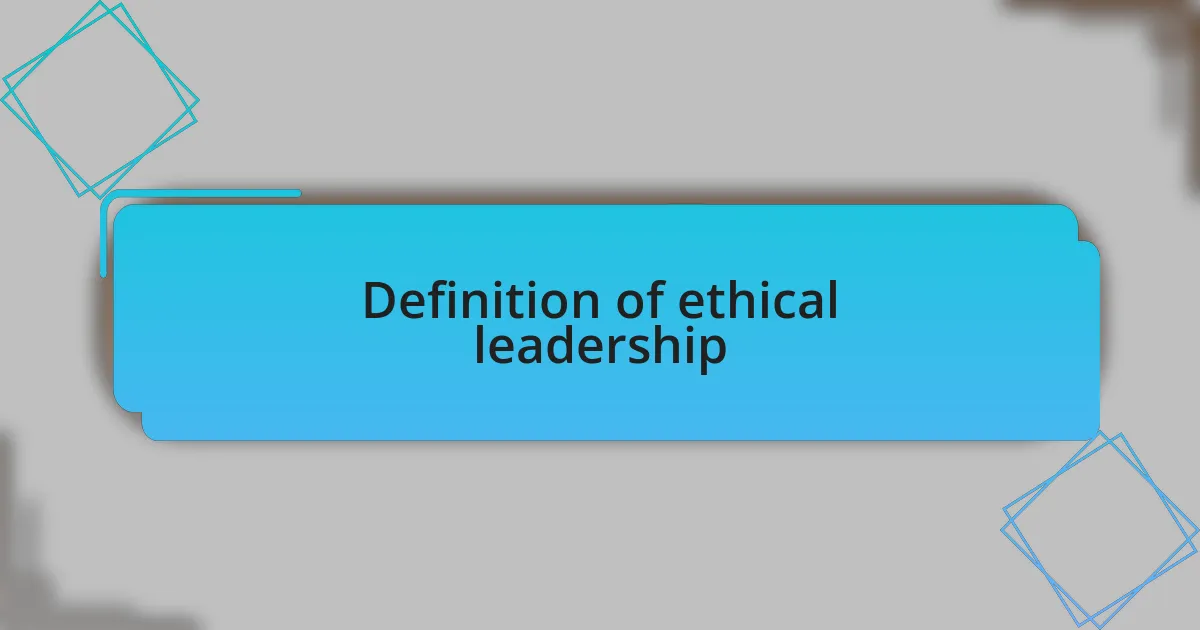
Definition of ethical leadership
Ethical leadership is fundamentally about guiding others with integrity, fairness, and respect. In my observation, a leader who embodies these qualities not only fosters trust but also inspires others to embrace similar values. Have you ever worked under a leader who made you feel valued and understood? It’s a game-changer.
At its core, ethical leadership involves making decisions based not just on what is beneficial for oneself, but considering the broader impact on the community and stakeholders. This principle reminds me of a manager I had who always asked for input from the team before making a decision. It felt empowering, and it demonstrated that he valued our perspectives; this ultimately strengthened our commitment to the organization.
Moreover, ethical leadership seeks to create an environment where transparency is the norm. Reflecting on my experiences, I’ve seen how leaders who openly communicate their values and decisions cultivate a culture of openness. Isn’t it easier to follow someone who is upfront about their intentions? When leaders exemplify these ethical practices, they pave the way for a more trustworthy and accountable organization.
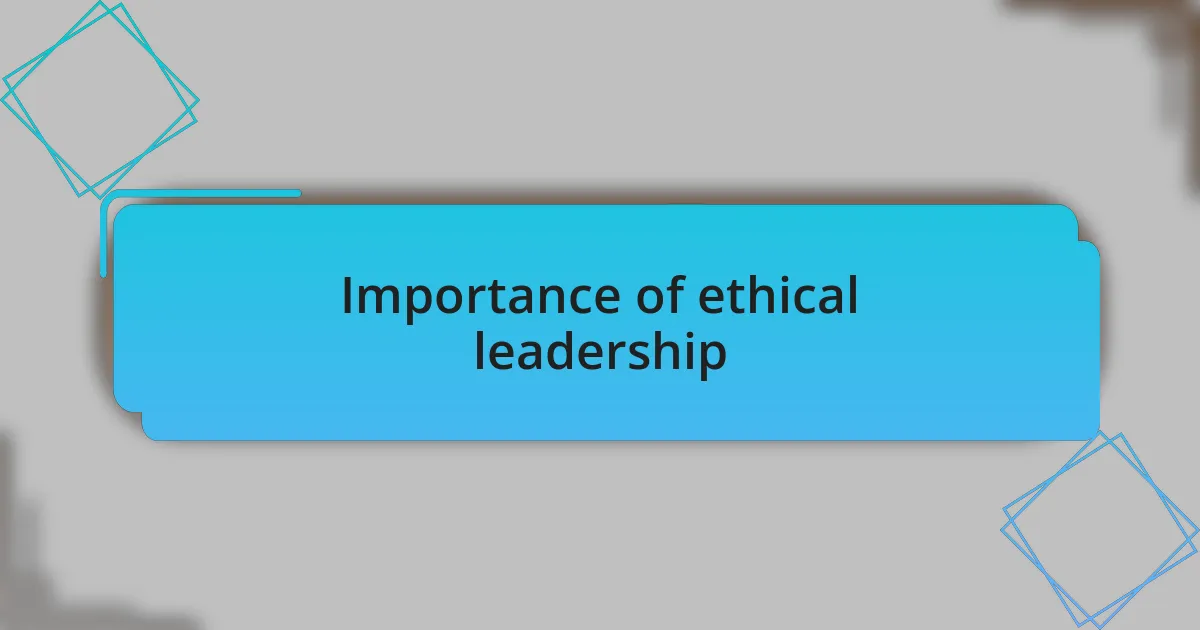
Importance of ethical leadership
Leaders who uphold ethical standards create a ripple effect throughout their organizations. When I worked under a leader dedicated to ethical practices, I noticed how her commitment encouraged my colleagues to act with integrity in their roles. Isn’t it fascinating how one person’s values can transform an entire team’s culture?
The importance of ethical leadership extends beyond mere compliance with rules; it shapes the moral compass of the organization. I remember a time when a significant project faced a tough decision that risked compromising our values for profit. The leader chose to decline the venture, prioritizing our principles over financial gain. That choice resonated with me, highlighting how ethical decisions can reinforce a collective identity rooted in respect and trustworthiness.
Moreover, ethical leadership plays a crucial role in combating corruption. Reflecting on instances I’ve observed, organizations with strong ethical leaders regularly address unethical behaviors early on, creating a safer environment for employees to raise concerns. Wouldn’t you agree that fostering an atmosphere where integrity is valued makes a lasting impact on overall accountability? When leaders are committed to ethical principles, it not only shields the organization from corrupt practices but also instills confidence among stakeholders.
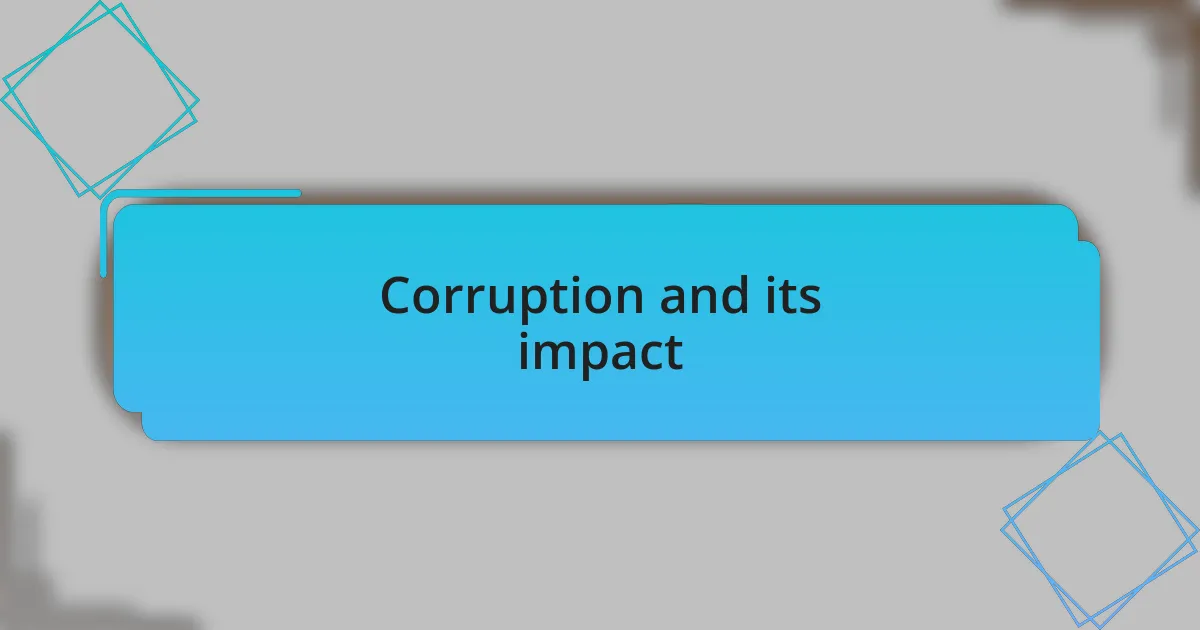
Corruption and its impact
Corruption can seep into the very fabric of an organization, leading to decreased trust among employees and stakeholders. I witnessed this firsthand during my time at a company where corrupt practices were overlooked. It created an atmosphere of skepticism and fear, where team members feared speaking up about unethical behavior. Can you imagine how a lack of trust can stifle innovation and collaboration in such an environment?
The impact of corruption extends beyond immediate financial loss; it tarnishes reputations and erodes public confidence. I recall a major scandal involving a well-respected firm that lost its credibility overnight due to corrupt dealings. The fallout affected not just the executives involved but also the innocent employees who found themselves entangled in the aftermath. Isn’t it tragic how corruption can ripple outward, affecting countless lives and careers?
Furthermore, corruption often leads to systemic inefficiencies, as resources are misallocated due to unethical decision-making. In one experience, I noticed that a team’s project was sidelined because higher-ups chose to funnel resources into ventures that benefited only a select few. It struck me how corruption not only hinders growth but also demotivates hardworking individuals who deserve recognition for their efforts. What does that say about the balance between ethics and success?
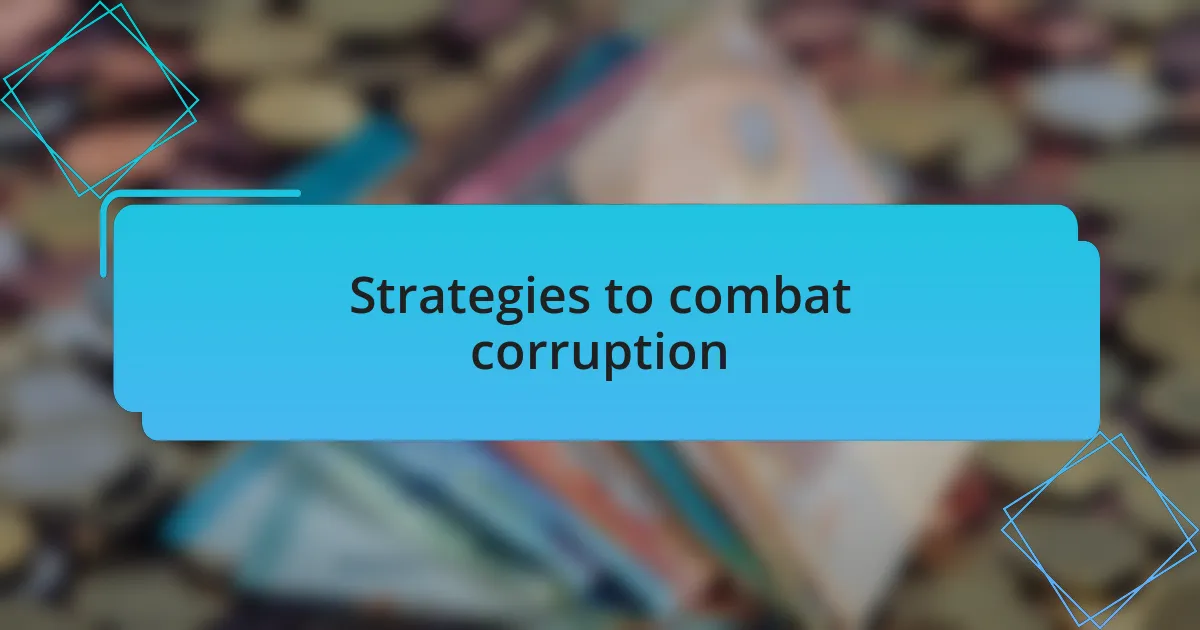
Strategies to combat corruption
One effective strategy to combat corruption is fostering a culture of transparency within organizations. I recall a time when a team I worked with implemented an open-door policy, encouraging employees to voice concerns without fear of retribution. This initiative not only empowered staff but also created a collaborative environment where ethical behavior was reinforced. Isn’t it fascinating how transparency can act as a powerful deterrent against unethical practices?
In addition to transparency, regular training on ethical decision-making can significantly reduce corruption. At a previous organization, we held workshops where real-life scenarios were discussed, allowing employees to navigate dilemmas openly. I remember the conversations that emerged from these sessions; they opened everyone’s eyes to the potential pitfalls in our daily decision-making. Wouldn’t it be beneficial for all staff members to have these tools at their disposal, creating a more ethically aware workforce?
Lastly, establishing accountability mechanisms can serve as a strong foundation against corrupt practices. In an experience at a nonprofit, we set up an independent review board to monitor financial transactions and decision-making processes. I saw firsthand how this increased accountability brought a sense of responsibility to team members, as they understood that their actions were under scrutiny. How can we expect to build integrity if we don’t first establish consequences for unethical behavior?
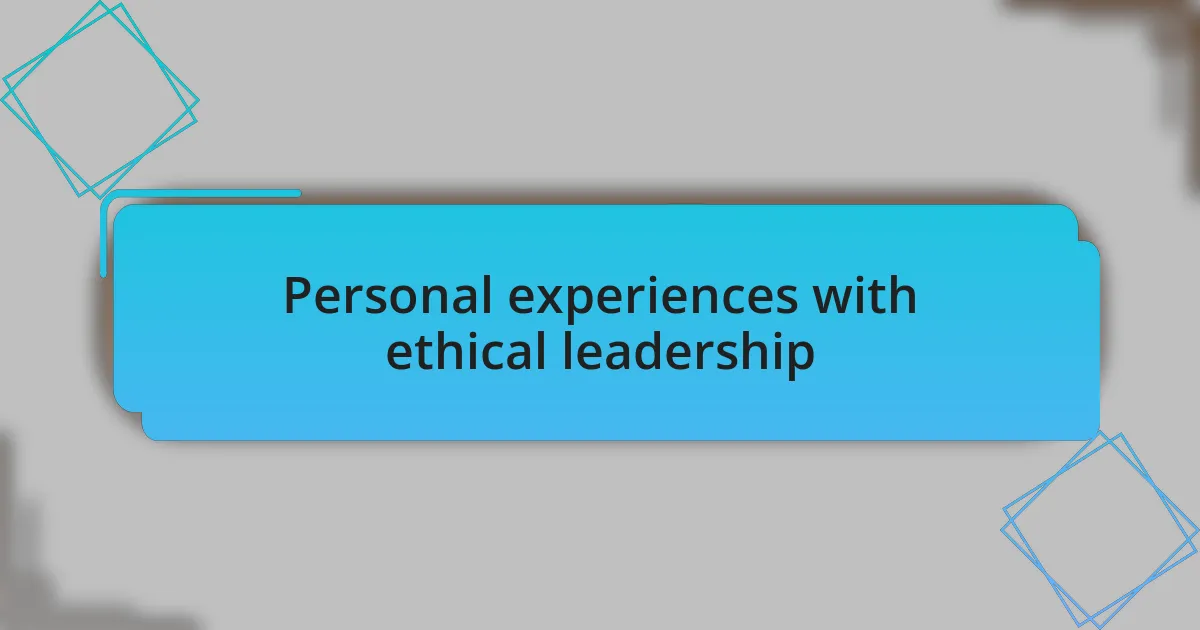
Personal experiences with ethical leadership
Reflecting on my experiences with ethical leadership, I recall a moment when a manager at my previous job took a stand against a common practice that many of us deemed acceptable at the time. She refused to engage in backdoor dealings, despite the potential for personal gain. Witnessing her integrity in action profoundly affected me; it ignited a desire in my colleagues and me to hold ourselves to higher standards. Isn’t it amazing how one person’s courage can inspire a collective shift in values?
On another occasion, I worked alongside a leader who placed immense importance on open dialogue about ethical dilemmas. During our weekly meetings, he encouraged us to bring any concerns to the table, fostering an atmosphere where honesty trumped fear. This practice not only solidified our trust in each other but also reminded me of the strength found in vulnerability. Doesn’t it feel liberating to express thoughts freely without the weight of judgment?
I’ve also seen the powerful effects of ethical leadership when it comes to community trust. In a project aimed at rebuilding a neighborhood, our leader made a point to engage residents in every decision. Their voices were valued, and we often found ourselves adjusting our plans based on their feedback. Personally, this experience reinforced my belief that ethical leadership is not just about making the right choices but about creating spaces where others feel empowered to contribute. How often do we stop to consider the impact of inclusivity in our leadership approaches?

Lessons learned in ethical leadership
In my journey through various leadership roles, one key lesson I learned is the importance of transparency. I remember a scenario where a financial decision was made without consulting the team. It created confusion and resentment, highlighting how critical it is for leaders to communicate openly about their choices. Have you ever experienced a lack of clarity that left you questioning your faith in leadership? I certainly have, and it taught me that ethical leaders must prioritize clear communication to maintain trust.
Another significant insight has been the role of accountability in ethical leadership. During a project, I witnessed a team member make a mistake. Instead of shifting blame, our leader took the opportunity to foster a learning environment. Reflecting on this, I realized that promoting accountability not only empowers individuals to learn from their errors but also cultivates a culture where mistakes are viewed as growth opportunities. Isn’t it refreshing when leaders model this kind of behavior, encouraging everyone to strive for improvement?
Lastly, I’ve seen the value of empathy in ethical leadership first-hand. There was a time when a colleague faced personal challenges, and our manager went out of her way to support him through flexible work arrangements. Observing her empathy seriously impacted my understanding of leadership. It made me consider, how often do we prioritize compassion in our decision-making? For me, this lesson reinforced the idea that ethical leadership isn’t just about making sound decisions but also about caring for the people behind those decisions.